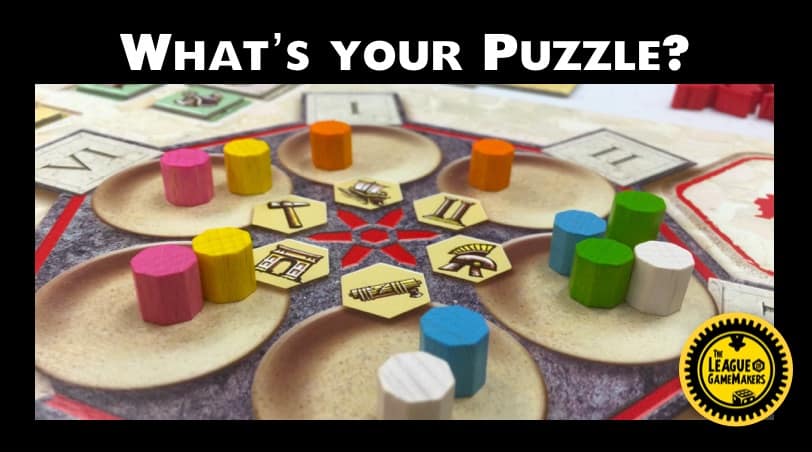
When we playtest games, we tend to get a lot of suggestions from players. As designers, it’s our job to parse those comments and decide which suggestions would lead to good changes in the game, which to write off, and which could be indicative of underlying problems (even if they’re not directly useful).
It can be easy to write off suggested changes, especially when you feel like the game is done. Taking the suggestion to heart would mean making changes to the components and doing more testing. If you are happy with the game as-is, then this can feel like extra work for no good reason.
A REAL LIFE EXAMPLE:
Terra Prime
I am personally guilty of this exact thing… 10 years ago I had a very good suggestion from a player of Terra Prime. The player suggested having the space hexes face UP during setup, so you can see where all the planets are from the outset, then cover the center of the tiles with Exploration tiles so you still have the exploration aspect to the game. I thought this was an interesting idea, and thought I might even like it if I tried it… but I was pretty happy at the time with the exploration aspect as it was – face down hex tiles, and you explore to find the planets. Specifically, I liked the idea that the player who explored a tile got to choose its orientation. So while I figured I might try the suggestion for a future expansion or something, I completely wrote it off at the time.
I COMPLETELY WROTE IT OFF…
After the game came out, one of the biggest questions people had was to do with the rule (there’s only 1 rule!) about tile placement (“no 2 adjacent sectors can contain planets”). I was surprised by this, since I figured that one rule wouldn’t be hard to grok, and as I said, I liked the agency players had to create the board layout. When working on an expansion I finally did try the suggestion from that playtester: I laid the tiles out face up, and covered the center of them with new Exploration tiles (with Aliens and Asteroids, and a few new things I added such as Wormholes and Sunstars). It turns out I liked this method very much, and it removed the potential for that one rules question people were having.
I HADN’T DONE MY DUE DILIGENCE.
Had I tried that suggestion out when it was made, I probably would have used it in the original release of Terra Prime, and the game would have been better for it. With Terra Prime that might not have mattered too much, what with the poor manufacturing, and the fact that very few people every really got a chance to play the game… but the point is that I got a good suggestion, and I ignored it. I don’t want to make that mistake again.
LEARNING FROM OUR MISTAKES:
Deities & Demigods player board
A couple of weeks ago I was in Seattle for Sasquatch, and I got a chance to play my current design, Deities & Demigods, with Tim Eisner and his brother Ben. It was a pretty good test, and Tim and Ben had some interesting comments. I took note of two of them in particular:
1. In response to my saying I needed a round counter, and the idea of simply putting a round marker on the initiative track and make that track do double duty as the game timer, Tim and Ben suggested that the round timer work like the minimum devotion markers in the game, and as the rounds advance, the initiative markers get pushed along the track and begin on the 2nd/3rd/4th/5th space, making the rewards from the initiative track easier to collect. That way the game would kind of ramp up, and it would support my desire for players to have easy access to 1 or 2 Deity rewards even if they pretty much ignore Zeus.
2. Tim and Ben suggested that the high end of the Hermes devotion track (collect 2 gold) was boring compared to the other tracks. I hadn’t had any problems with it thus far… 12 gold seemed like a pretty good thing to get, but it’s true that just getting a handful of gold isn’t terribly interesting. We chatted about it and came to the suggestion that perhaps less gold and an immediate advance on another devotion track would be appropriate, and more interesting than just a handful of gold.
In an attempt to learn from my mistakes, I made an effort to try these tweaks, even though neither one was really solving a problem that existed in the game. I updated my prototype files, and I got ready to bring my prototype to Dallas with me. I got Deities & Demigods to the table 3 times during BGGcon last week, here’s how it went:
In the first game, I tried tweak number 1 (which I’ve since dubbed “rising tide” variant, as a rising tide floats all boats, and the initiative markers are currently boats), but I didn’t cange the Hermes track yet. The rising tide variant did a couple of good things – it was a little bit interesting to get easier access to the early rewards on the Zeus track, and indeed players were able to get deity cards without concentrating on Zeus. However, it introduced some fiddliness, and some timing questions… I wasn’t sure it was worth the effort.
I wanted to try that tweak again before passing judgment on it, so I kept it in for the 2nd game. And this time I also tried the alternate Hermes track… instead of 1, 4, 8, or 12 gold from Hermes, you get 1, 3, 6, or 10 gold plus a devotion advance in 0, 1, 2, or 3 different tracks. As it turns out, these instant devotion bumps basically undermined the main mechanism of the game! Players could use Hermes to directly bump up their devotion to different deities, and when those deities came up they could simply resolve them, hardly ever having to pay them any gold. As a result of that, players were ending up with large amounts of gold just sitting around unspent, and I didn’t like the effect of these devotion bumps at all! I might have gone a little overboard with this suggestion, perhaps a single cube bump at the top of the Hermes track would have been ok, but this certainly wasn’t. Based on how this test went, I think going back to just awarding gold on the Hermes track is probably the way to go.
As for the rising tide variant, having played it a 2nd time, I think I decided that overall it was more trouble than it was worth. While it did do something sort of interesting, it wasn’t a good addition to the game, so I’ll just be using a round counter to track rounds.
In the third game, I didn’t use either of the tweaks, reverting back to the game as it was 2 weeks ago. I think I like that better, so I don’t think I’ll end up using either of the suggestions from Sasquatch.
BACK TO SQUARE ONE?
So were those tests a waste of time? Well, to an extent one could argue that they were, but that’s a hard sell. Unless you know for sure that a suggestion isn’t going to pan out, then it’s worth doing due diligence and testing it out. I was happy I tried both of those tweaks, even though I won’t be keeping them.
And as a side note, when implementing untested tweaks to your game, it’s best to do it with a group who’s played before, rather than in a learning game!
So there you have it. You gotta do your due diligence, because you never know which decent-sounding suggestions will be right for the game, and which just won’t pan out, until you try them.








